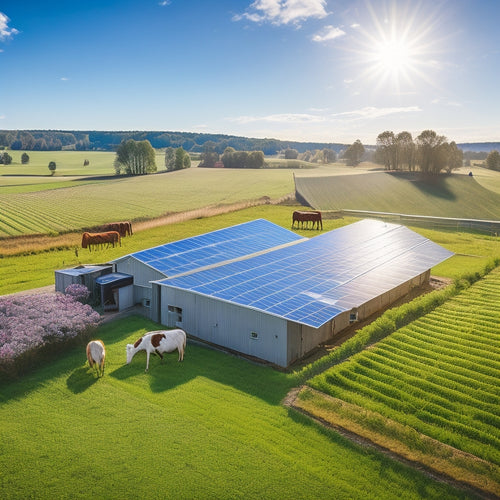
Maximizing Home Energy Efficiency: Why It Matters
Share
By optimizing your home's energy efficiency, you can greatly reduce your energy bills, minimize your carbon footprint, and enhance your indoor comfort. Conducting an energy audit identifies areas for improvement, and installing efficient appliances and smart thermostats can reduce energy consumption. Additionally, sealing air leaks and upgrading to energy-efficient lighting can also make a substantial impact. As you make these changes, you'll not only save money, but also contribute to a more sustainable future. And, with the right strategies, you can make even more remarkable progress towards energy independence, so let's investigate the many opportunities that await you.
Overview
- Maximizing home energy efficiency reduces energy consumption, leading to lower utility bills and a decreased carbon footprint.
- Energy-efficient upgrades increase property value, appealing to eco-conscious buyers, and provide long-term savings.
- Conducting an energy audit identifies areas for improvement, and implementing changes can reduce energy bills by 10-50%.
- Energy independence is achievable through renewable energy sources, reducing reliance on fossil fuels and promoting sustainability.
- Home energy efficiency contributes to national energy goals, reduces air pollution, and conserves natural resources.
Understanding Home Energy Efficiency
Your home's energy efficiency is an essential aspect of your daily life, greatly impacting your wallet and the environment. To optimize energy efficiency, you should consider conducting an energy audit to identify areas of improvement.
Installing efficient appliances and smart thermostats can considerably reduce energy consumption. Thermal imaging can help detect heat loss and gain, enabling you to take corrective measures.
Passive design principles, such as proper insulation and orientation, can also contribute to energy conservation. Furthermore, evaluating your energy needs energy mapping and choosing the right solar panels can further enhance energy efficiency.
Familiarize yourself with local building codes and energy ratings to guarantee your home meets the required standards. By taking these steps, you'll be well on your way to maximizing your home's energy efficiency and enjoying the associated benefits.
Benefits of Solar Panel Systems
You're likely considering solar panel systems as a key component of your home's energy efficiency strategy.
By utilizing the power of the sun, you'll tap into a renewable energy source that reduces your reliance on the grid and, in turn, lowers your energy bills.
With solar panels, you'll not only minimize your environmental footprint but also enjoy significant long-term savings.
Renewable Energy Source
Solar panel systems employ sunlight to generate electricity, offering a clean, renewable energy source that reduces reliance on fossil fuels and lowers your carbon footprint. You're not limited to solar power, though - there are other renewable energy sources to investigate. Consider the following options:
| Renewable Energy Source | Description | Benefits |
| Wind Energy | Captures wind to generate electricity | Low operating costs, scalable |
| Geothermal Systems | Exploits heat from the Earth's core | Reliable, consistent energy supply |
| Hydropower Potential | Draws energy from moving water | High energy conversion rate |
| Biomass Resources | Converts organic matter into energy | Carbon neutral, waste reduction |
| Energy Storage | Saves excess energy for later use | Increases energy independence |
Reduced Energy Bills
As a result of installing solar panel systems, homeowners can markedly reduce their energy bills.
You'll be able to generate your own clean energy, reducing your reliance on the grid and slashing your utility costs.
But that's not all - you can further optimize your energy savings by implementing other energy-efficient measures.
Consider conducting an energy audit to identify areas of improvement, and upgrading to smart thermostats and energy-efficient appliances.
By making these behavioral changes, you can maximize your energy conservation efforts.
Additionally, many utility companies offer incentives for homeowners who invest in home automation and renewable energy systems.
With thermal imaging, you can even identify areas of heat loss and gain, allowing you to fine-tune your energy conservation strategy.
Home Solar Panel Energy Efficiency
Your roof is a prime spot for utilizing free energy from the sun, and installing solar panels can greatly reduce your reliance on the grid. By capturing the power of solar energy, you can greatly lower your energy bills and contribute to a more sustainable future.
Advances in solar panel technology have made it more efficient and affordable to generate electricity from sunlight. Additionally, energy storage solutions like batteries allow you to store excess energy generated during the day for use at night or during power outages.
By embracing independence from grid electricity energy autonomy, you can reduce your vulnerability to utility companies and nurture community pride and ownership. With the right system, you can enjoy the freedom of generating your own clean energy and reducing your carbon footprint.
Reducing Home Energy Consumption
To reduce your home's energy consumption, you'll want to focus on eliminating energy-wasting culprits.
Start by sealing air leaks, which can account for up to 30% of heating and cooling losses.
Next, you'll upgrade your lighting fixtures to energy-efficient options and make certain your ductwork is properly insulated to optimize HVAC performance.
Seal Air Leaks
One of the most significant energy-wasting culprits in your home is air leakage, which can account for up to 30% of your heating and cooling energy consumption.
You can't afford to let heated or cooled air escape through gaps and cracks. To determine the energy efficiency of your home, it's crucial to calculate daily energy needs and identify areas of improvement.
To seal air leaks, you'll need to inspect your home's exterior and interior for openings around windows, doors, electrical outlets, and switches.
Use caulking techniques to fill gaps around stationary objects like windows and doors. For moving parts like doors and windows, apply weather stripping to create a tight seal.
Don't forget to check for air leaks in your ductwork, attic, and basement, as these areas can be major contributors to energy loss.
Upgrade Lighting Fixtures
Energy-guzzling lighting fixtures can silently drain your wallet, accounting for up to 10% of your home's energy consumption. You can take control of this unnecessary expense by upgrading to energy-efficient lighting fixtures.
Consider installing smart lighting systems that learn your habits and adjust brightness accordingly. A professional energy audit can identify areas where lighting upgrades will have the greatest impact.
Insulate Ductwork Properly
By addressing your home's lighting fixtures, you've taken a significant step towards reducing energy consumption.
Now, it's vital to focus on insulating your ductwork properly to prevent energy loss. Duct insulation techniques are fundamental in preventing heat gain during summer and heat loss during winter.
Uninsulated or poorly insulated ducts can account for up to 30% of energy loss, which translates to increased energy bills and a significant environmental impact.
Solar Power Cost Savings Analysis
Installing solar panels can greatly reduce your reliance on the grid, and a thorough cost savings analysis is essential to understand the financial benefits of utilizing solar power. With the right solar financing options and tax incentives, you can markedly reduce your energy bills and increase your savings.
| Year | Energy Savings | Cumulative Savings |
|---|---|---|
| 1 | $500 | $500 |
| 3 | $1,500 | $2,000 |
| 5 | $2,500 | $4,500 |
| 10 | $5,000 | $9,500 |
| 20 | $10,000 | $19,500 |
Achieving Energy Independence Future
With a significant reduction in your energy bills, you're now ready to take the next step towards achieving energy independence.
By investing in sustainable living solutions, you can break free from reliance on the grid and enjoy the freedom that comes with generating your own power. Energy independence is no longer a distant dream, but a tangible reality.
With the right mix of renewable energy sources, energy storage, and smart grid technologies, you can create a self-sustaining energy ecosystem. By utilizing the power of the sun, wind, and other natural resources, you can reduce your carbon footprint and contribute to a cleaner, greener future.
Frequently Asked Questions
Can I Install Solar Panels on My Old or Historic Home?
You can install solar panels on your old or historic home, but you'll need to contemplate solar panel aesthetics to preserve your home's original charm and comply with historic home regulations, which may require additional permits and approvals.
Do Energy-Efficient Appliances Require Special Maintenance?
You'll find that energy-efficient appliances generally don't require special maintenance, but following energy saving tips, like cleaning filters and coils, can enhance appliance longevity, ensuring your investments pay off in the long run.
Are Energy-Efficient Upgrades Tax-Deductible in My State?
You'll want to check your state's specific incentives for energy-efficient upgrades, as tax credit eligibility varies; research online or consult a tax pro to determine which upgrades qualify for deductions in your state.
Can I Generate Energy With Solar Panels on a Cloudy Day?
You'll be delighted to know that, yes, you can still utilize energy with solar panels on a cloudy day, thanks to their impressive cloudy day performance, which guarantees a notable solar panel efficiency, even when the sun hides behind the clouds.
Will Energy-Efficient Upgrades Increase My Home's Resale Value?
You'll be pleased to know that energy-efficient upgrades can greatly enhance your home's resale value, as they offer potential buyers a guarantee of long-term energy savings, making your property a more attractive and lucrative investment.
Ready to Buy
By taking control of your home's energy efficiency, you're not only saving money, but also doing your part for the planet. Remember, "an ounce of prevention is worth a pound of cure" - investing in energy-efficient solutions now will pay off in the long run. With solar panels, reduced consumption, and smart habits, you'll be well on your way to achieving energy independence and a more sustainable future. So, take the first step today and start maximizing your home's energy efficiency - your wallet and the environment will thank you!
Related Posts
-

What Do I Need to Know About Farm Solar Panels
When considering farm solar panels, you need to assess costs, benefits, and technical specifics. Initial investment c...
-

Why Outdoor Solar Lighting Systems Are Sustainable
Outdoor solar lighting systems are sustainable because they utilize renewable energy, drastically reducing your carbo...
-
Average Lifespan of Solar Battery Banks
The average lifespan of solar battery banks generally ranges from 5 to 15 years. This variation mainly stems from the...

